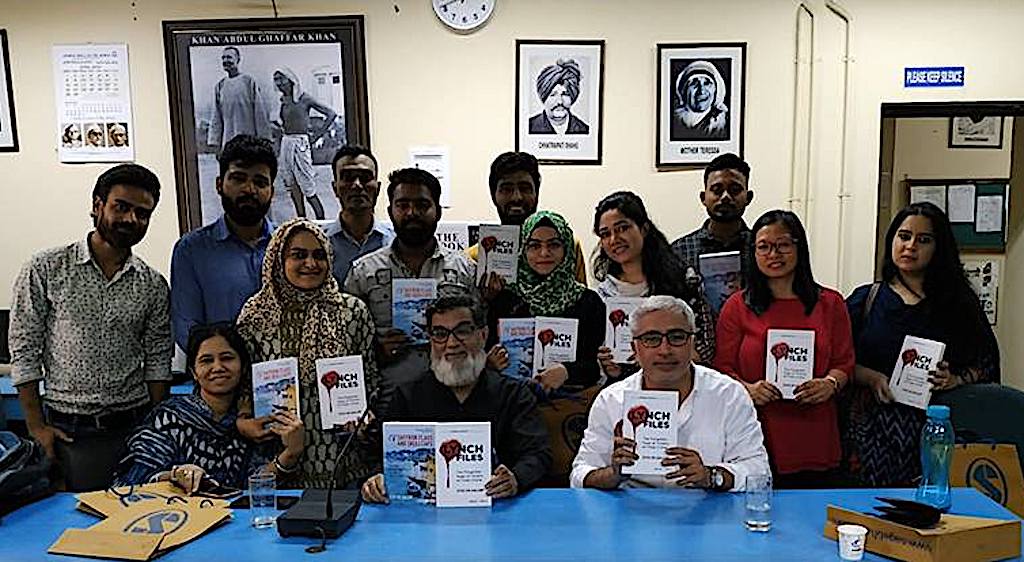Badre Alam Khan for BeyondHeadlines
On Friday, 5 April, Centre for the Study of Social Exclusion and Inclusive Policy, Jamia Millia Islamia organized a book talk on ‘Lynch files: The forgotten saga of victims of Hate crime’ written by the noted journalist, Ziya Us Salam, published by Sage in 2019.
While appreciating his daring work the Director of the Centre, Dr Rahul Ramagundam said that we as citizens must strongly condemn this inhuman act which ‘brutalised’ our society. “Lynching against any citizen irrespective of their religion and caste must be condemned”, said Ramagundam. The meeting was attended by the Jamia students, research scholars, and faculty members.
Salam in his talk touched the range of the issues like the role of media, police, exiting BJP government’s stand, and statements of BJP’s ministers (who openly supported and encouraged the so-called ‘Gau Rakshaks Dal’) mainstream political parties, and human rights institutions like NHRC (National Human Right Commission) etc.
He said that all these public institutions have not seriously acted according to the norms of Indian constitutions including the Supreme Court directions to check and stop the brutal act like lynching.
“The NGOs, Human rights activists and few leaders belonging to left parties have taken a stand and demanded punishment for doing these inhuman and gruesome act”, said Salam while delivering his talk. Moreover, he said that the community leaders have not done anything substantial to the victims and taken any firm stand against mob-lynching. However, according to Salam the Muslims religious organisations like Jamiat e Ulama-e-Hind and Jamat-e-Islami have provided some relief and rehabilitation, including some legal support to the victims.
While citing the cases of lynchings, he said that mainstream media hardly covered these incidents, which took place in 2015 onwards and that was the reason which compelled me to document the lynching incidents. For Salam, calling cow vigilante groups as a Gau Rakshak Dal would be a great mistake and they should be called a ‘Cow militia’.
While discussing the mob-lynching incidences which happened in different states mostly ruled by the BJP, Salam mentioned particular cases like, Akhlaq (Dadri, UP), Afrazul (Rajasthan), Junaid (Ballabhgarh, Haryana), Alimuddin Ansari (Ramgarh, Jharkhand) etc., he underlined that the BJP leaders and ministers appreciated the perpetrators of the hate crime and mob-lynching by saying that it will help us to get more vote so that we could remain in power.
While discussing the Una incident which was followed by attacks on Dalit, Salam underlined that due to the active role of Dalit leader and Social activists like Jignesh Mevani and others who launched agitations and protests; the violence against Dalit got politicized and became national issues. After the Una agitations, PM Modi had brooked his silence and said that don’t kill our Dalit brothers but there were no promises made to give compensation and rehabilitate the affected victims. It is surprising to note that if anyone criticizes the government’s stand on the above-mentioned issues, he will immediately be put into the category of “anti-national”.
While discussing the historical context of Cow killing and eating, Salam said that an eminent historian of ancient India like D.N Jha has underlined that during the ancient time cow meat was served to the guests and eaten by all. Even after the arrival of colonial rule in the 19th century, the British used to kill the cow. However, only when RSS and Hindu Mahasabha came into existence in the 20th centenary, Gau Raksha Dal came into surface and cow became a sacred animal to a ‘political animal’ and as a result of this, communal riots occurred between Hindus and Muslims around killing of the cow.
However, in case of Pahlu khan and other lynching cases, it is interesting to note that ‘Cow militias’ and vigilantes groups after mob- lynching used to make videos and uploaded it on WhatsApp and social media for creating further rage in the larger society.
“Unlike in the case of Dalit who made lynching a national issues (Una agitation can be seen in this light) and pressurized the government to take the stand in favor of Dalit; it is to be noted that in the case of lynching against Muslim, one could note that the fear among the Muslims was so high that they could not even think of, to launch protests and agitations as if we as a community launched and registered protests, we might be considered as ‘anti-national’”, said Salam.
Unlike the north India, while citing the case of South India and North East, where Cow has not been considered as a ‘sacred symbol’ and people used to eat cow meat till today; Salam said that given the diversity and pluralism of our country, it is not feasible to make law against the practice of eating cow meat.
He highlighted that taking these incidents into account, the Supreme Court asked the government takes strong measures and make a law against the lynching. However, while welcoming the court verdict, for Salam no law will be effectively implemented without the ‘Social will’. For instance, social evils like dowry and rape will not be completely eliminated only by making law without launching a social movement against these evil practices and sensitizing society. While concluding his talk, he said that in spite of deep crisis and challenges, presently we are facing, we must not lose our hope to save the essence of the idea of India which is based on secularism, pluralism, and democracy in years to come.
(The author is a research scholar at University of Delhi)









